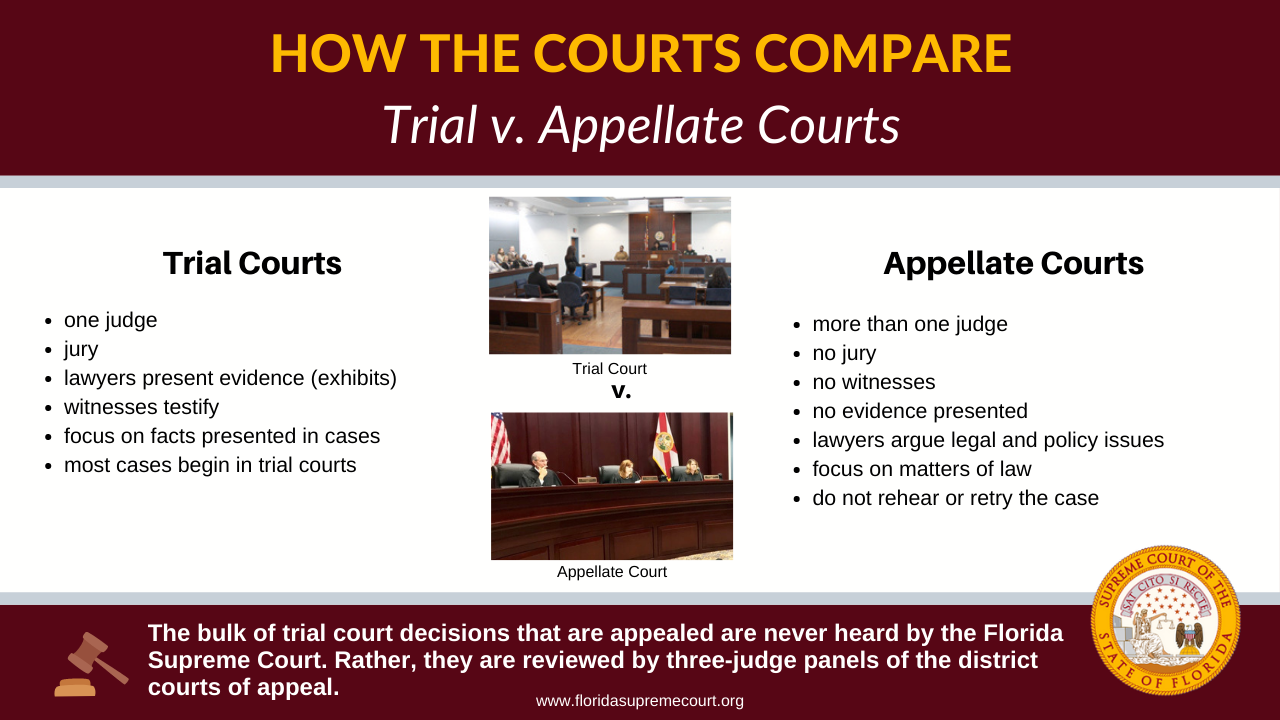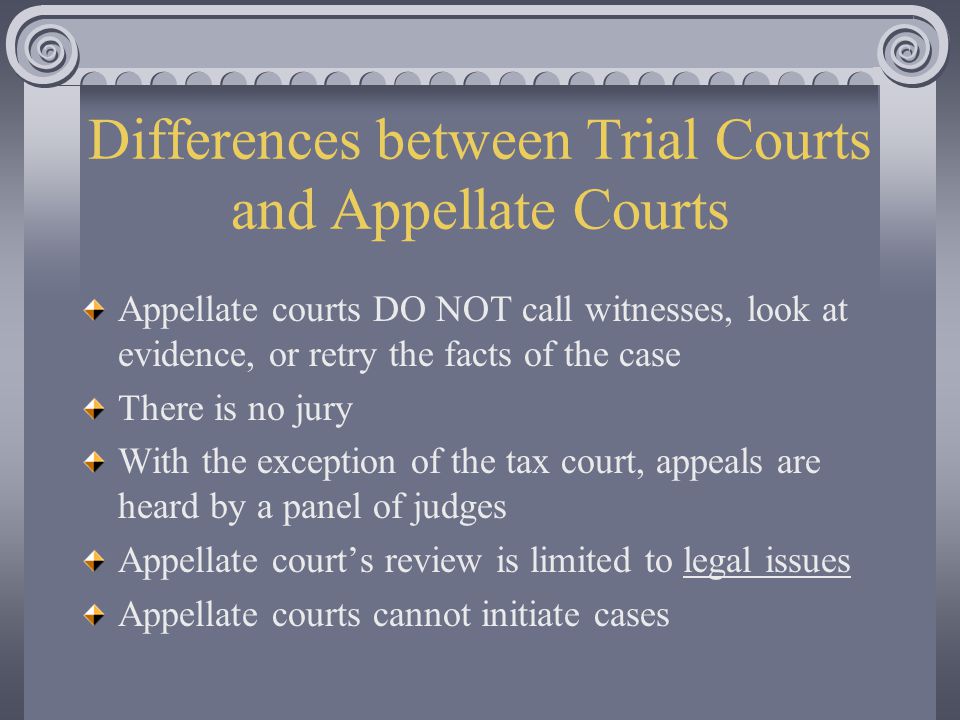Explain Any Two Difference Between a Trial and Appellate Courts
List the major differences between trial and appellate courts parties names. Its exclusive original jurisdiction extends to all cases between the Government of India and the States of India or between Government of India and states on one side and one or.

Chapter 5 Learn The Key Differences Between Trial And Appellate Courts Understand The Differences Between Adversary And Inquisitional Judicial Systems Ppt Download
The appellate jurisdiction refers to any higher level court that has the power to hear the appeal after a decision by the trial court has been requested for a.

. In appellate courts the lawyers simply argue legal and policy issues before the judge or a group of judges. Appellate courtroom docket is bigger courtroom docket than trial courtroom docket. That judge decides what evidence can and cannot be used and often decides the outcome of the case.
In appellate courts the lawyers simply argue legal and policy issues before the judge or a group of judges. Whereas trial courts resolve both factual and legal disputes appellate courts only review claims that a trial judge or jury made a legal mistake. A fundamental distinction between a trial court and an appeal court is that whereas a trial court normally has a single judge presiding over a case an appellate court usually has a panel of justices deciding on the case.
Just keep in mind that the appellate court will not hear the entire case. Appellate court is an appeals court and reviews the verdict of the trial court. Nor do they review the facts regarding the case.
In a 300-500 word essay please respond to the following prompt. What are the most important differences between trial and appellate court functions and processes in both state and federal courts. The original jurisdiction of a court is the power to hear a case for the first time as opposed to appellate jurisdiction when a higher court has the power to review a lower courts decision.
Another significant distinction is that in a trial court a jury may or may not be used. In an appellate court the party seeking to overturn the decision has to prove that the reasoning in the original decision was flawed. How are state and federal appellate courts.
Be sure to identify and fully explain at least four 4 differences. Here are the three biggest differences between the appellate court and trial courts. The deference to the trier of fact trial court means that as a practical matter appeals are rarely won.
For example the appellate court may disagree with the trial judges interpretation of the meaning of a law or it may disagree with a ruling the trial judge made about what evidence should be admitted or excluded to the trier of fact. In trail court there is only one judge in the courtroom. The second difference between the two courts is the judges.
Difference Between Courts And Courts. Hence I can only say in the end of this discussion that trial court advocacy is much relied on facts of the case whose area and scope is wider whereas appellate court advocacy is fought on finding faults from the judgement of the trial court as well as errors in interpretation of law and construction of documents or other evidence whose area and scope is not so extensive and. Appellate courts on the other hand do not have a jury provision.
Evidence and witnesses are presented before trial court while appellate court reviews the decision made by trial court and checks to see that there is a point of fact or point of law in the appeal. In a trial court the factfinderusually a judge or jurywill make findings of fact. In appellate courts the lawyers simply argue legal and policy issues before the judge or a group of judges.
It is not a new trial. What is the difference between a trial court and an appellate court. On the other hand Maine does not have an intermediate appellate courts and therefore trial court decisions are appealed directly to the Maine.
Trial-judge sometimes jury appellate- majority vote of three judges. The appeals court uses appellate jurisdiction to review a lower courts decision. Trial courts settle cases between two parties seeking remedy for the very first time.
In trial court plaintiffdefendant or state defendant in appellate appellantappellee or petitionerrespondent Decision maker. Appellate Courts Do Not Decide Issues of Fact. Here then is the primary distinction between trial and appellate courts.
The second difference between the two courts is the number of judges. Appellate courts oversee cases where one of the parties does not like the trial court outcome. These courts are called trial courts.
For example trial court decisions in Florida first go to the District Courts of Appeal which issues an opinion and then to the Florida Supreme Court. In trial courts there is one judge in the courtroom. Another difference between a trial court and an appellate court is that if the trial court delivers a judgment that is not unanimous the case can be referred to an appellate court for review.
In the trial courts the lawyers present evidence and legal arguments to persuade the jury in a jury trial or the judge in a bench trial. The appellate court is more concerned with judgments the trial judge made during the trial such as whether certain evidence was admissible or if she made an appropriate decision regarding the interpretation of a law. In the trial courts the lawyers present evidence and legal arguments to persuade the jury in a jury trial or the judge in a bench trial.
The most important difference between an appellate court and a trial court is that the appellate court generally does not decide issues of fact. Some states have two levels of appellate court review. Appellate courts do not hear witness testimony or examine new evidence.
Evidence and witness are launched sooner than trial courtroom docket whereas appellate courtroom docket analysis the selection made by trial courtroom docket and check each theres any stage of actuality or stage of regulation inside the enchantment.

How The Courts Compare Supreme Court

11 17 09 Br Fill In The Blanks Trial Courts Are Concerned With Issues Of Appellate Courts Are Concerned With Today Understanding Types Ppt Download

The Intersection Of The Law And The 3 Branches Of Government Ppt Download
No comments for "Explain Any Two Difference Between a Trial and Appellate Courts"
Post a Comment